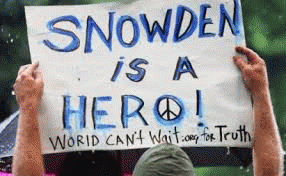Consider the power of Edward Snowden.
Six weeks after Obama declared, "I'm not going to be scrambling jets to get a 29-year-old hacker," he's canceled a summit because of him. Obama won't be meeting with Vladimir Putin because Putin extended temporary asylum to Edward Snowden. Some news accounts say it's a new Cold War.
White House press secretary Jay Carney sought to deny that Snowden was the only factor yesterday, but he wasn't entirely convincing:
"Now, when it comes to the decision to cancel the summit, as I think has been well reported, there were a variety of challenges that led to the assessment that this was not the right time to have a summit. Obviously, Mr. Snowden was a factor, but he was far from the only factor..."
Carney was also on the defensive about the government spying program that Snowden revealed, and some of what he said sounded like Big Brother explaining himself:
"...the metadata collection represented by [program] 215 is not content, it is telephone numbers and call times... we have made clear that under FAA 702, the NSA may not intentionally target a U.S. person['s emails]."
Carney was only too happy to talk about Russia's human rights record. He said the president condemns a Russian law that bars LGBT people from "propaganda."
"The President was very clear about his views on the issues of gay rights, LGBT rights, and concerns that have been raised internationally about laws in Russia."
Again: consider the power of Edward Snowden. A summit between superpowers has been cancelled and the human rights records of both countries are being scrutinized, thanks to a 30-year-old former government data analyst.
I'm sure there's a price for the cancellation of a meeting of Putin and Obama -- maybe even progress on the Iranian nuclear issue. But the benefits are already clear. The Russians and Americans are quarreling openly over human rights and Americans are discussing government actions we have a right to know about, a right that was nullified and that Snowden gave up his job, his comfort and some large portion of his liberty to revive.
Carney's defensiveness yesterday extended to fundamental character questions about the goodness of the American executive branch and of Edward Snowden's idealism. Notice how he puts him down:
"He's not a dissident. He's not a whistleblower. He is wanted on charges for the unauthorized public release of classified information."
Carney does so because Edward Snowden is speaking to Obama's own base -- liberals who believed in change -- and he is more believable than a president who seems like an extension of George W. Bush.
Carney knows how inspiring Edward Snowden has been to millions of us. He has stood up for a principle, government's accountability to its citizens. And he reminds us of the most basic ideal in democracy, that government is by the people. That an ordinary citizen, acting in conscience, can exercise power over a president.






